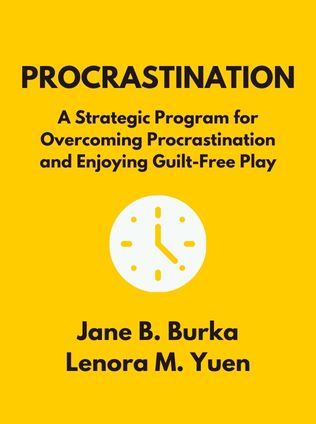
Procrastination
A Strategic Program for Overcoming Procrastination and Enjoying Guilt-Free Play
By Jane B. Burka and Lenora M. Yuen
Published 11/1988
About the Author
Jane Burka and Lenora Yuen are both distinguished psychologists who have made significant contributions to the understanding of procrastination. With a deep commitment to helping individuals overcome the barriers that prevent them from achieving their full potential, Burka and Yuen have spent decades researching and developing strategies to combat procrastination. Their work is rooted in both their extensive academic knowledge and practical experience, particularly through their pioneering efforts in leading the first group workshop specifically designed for procrastinators. This book, Procrastination, reflects their dedication to distilling complex psychological theories into actionable advice, making it accessible and useful for anyone struggling with procrastination.
The authors initially published Procrastination in 1983, and its impact was profound enough to warrant a second edition in 2008, which incorporated more contemporary research and insights. Their approach is unique in that it combines rigorous psychological analysis with empathy and practical advice, providing readers with not just an understanding of why they procrastinate, but also with the tools to change these behaviors. Burka and Yuen's work is a blend of scientific rigor and compassionate guidance, aimed at helping readers live more fulfilling, productive lives.
Main Idea
The central premise of Procrastination by Jane Burka and Lenora Yuen is that procrastination is not merely a matter of poor time management or laziness, but rather a complex psychological issue deeply rooted in fear and avoidance. The authors argue that procrastination serves as a coping mechanism to deal with underlying fears such as fear of failure, fear of success, and perfectionism. These fears create a cycle of avoidance that not only delays task completion but also prevents individuals from living fully and achieving their goals.
Burka and Yuen suggest that by recognizing and understanding these fears, individuals can begin to break the cycle of procrastination. The book provides a comprehensive exploration of the causes of procrastination, as well as practical strategies for overcoming it. The authors emphasize the importance of accepting life’s realities—such as the inevitability of imperfection and the finite nature of time—and focusing on what can be controlled: one’s behavior. Through self-awareness and behavioral changes, readers can learn to manage their fears and take proactive steps towards a more productive and fulfilling life.
Table of Contents
- The Problem of Procrastination
- Why People Procrastinate
- Biology and Procrastination
- Self-Esteem and Procrastination
- Upbringing and Procrastination
- Cultural Marginalization and Procrastination
- Solutions for Beating Procrastination
- Reality 1: You Can’t Choose Your Emotions—But You Can Regulate Them
- Reality 2: You’re Imperfect—But You’re Capable of Growth
- Reality 3: Time Is Finite—But You Can Learn to Make the Most of It
The Problem of Procrastination
Procrastination is more than just a bad habit; it is a deeply ingrained behavior that can have significant negative impacts on a person's life. Burka and Yuen define procrastination as the act of delaying or postponing tasks, particularly those that are important or require immediate attention. While procrastination might offer short-term relief from the anxiety or discomfort associated with a task, it ultimately leads to greater stress, missed opportunities, and a diminished sense of accomplishment.
The authors explain that procrastination can be positive, neutral, or negative depending on the context. Positive or neutral procrastination occurs when less important tasks are postponed to prioritize more critical ones. For example, delaying a household chore to spend time with a loved one can be seen as a positive form of procrastination. However, the focus of the book is on negative procrastination, where tasks are delayed to the extent that they interfere with leading a fulfilling and healthy life.
Negative procrastination has several detrimental effects, including:
- Poor Performance: Procrastinators often complete tasks at the last minute or miss deadlines altogether, leading to subpar results.
- Missed Opportunities: Delaying important decisions or actions can cause procrastinators to miss out on life-changing opportunities, such as career advancements or personal growth.
- Strained Relationships: Chronic procrastination can frustrate and disappoint friends, family, and colleagues, leading to strained or damaged relationships.
- Compromised Health: Procrastinators may neglect their physical health by avoiding exercise, failing to plan healthy meals, or postponing medical check-ups.
- Reduced Self-Esteem: The guilt and shame associated with procrastination can erode self-esteem, creating a vicious cycle where low self-worth leads to more procrastination.
Burka and Yuen emphasize that understanding the negative impact of procrastination is the first step towards overcoming it. By acknowledging how procrastination harms various aspects of life, individuals can begin to take proactive steps to address it.
Why People Procrastinate
Despite the clear negative consequences, many people continue to procrastinate because it provides temporary relief from the fear and anxiety associated with certain tasks. Burka and Yuen identify several common fears that drive procrastination:
Sign up for FREE and get access to 1,400+ books summaries.
You May Also Like
The Subtle Art of Not Giving a F*ck
A Counterintuitive Approach to Living a Good Life
By Mark MansonRich Dad Poor Dad
What the Rich Teach Their Kids About Money - That the Poor and Middle Class Do Not!
By Robert T. KiyosakiHow To Win Friends and Influence People
The All-Time Classic Manual Of People Skills
By Dale CarnegieFreakonomics
A Rogue Economist Explores the Hidden Side of Everything
By Steven D. Levitt and Stephen J. Dubner



















